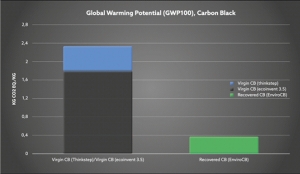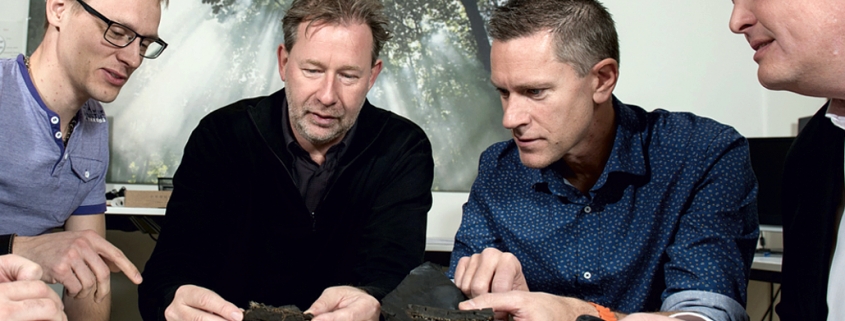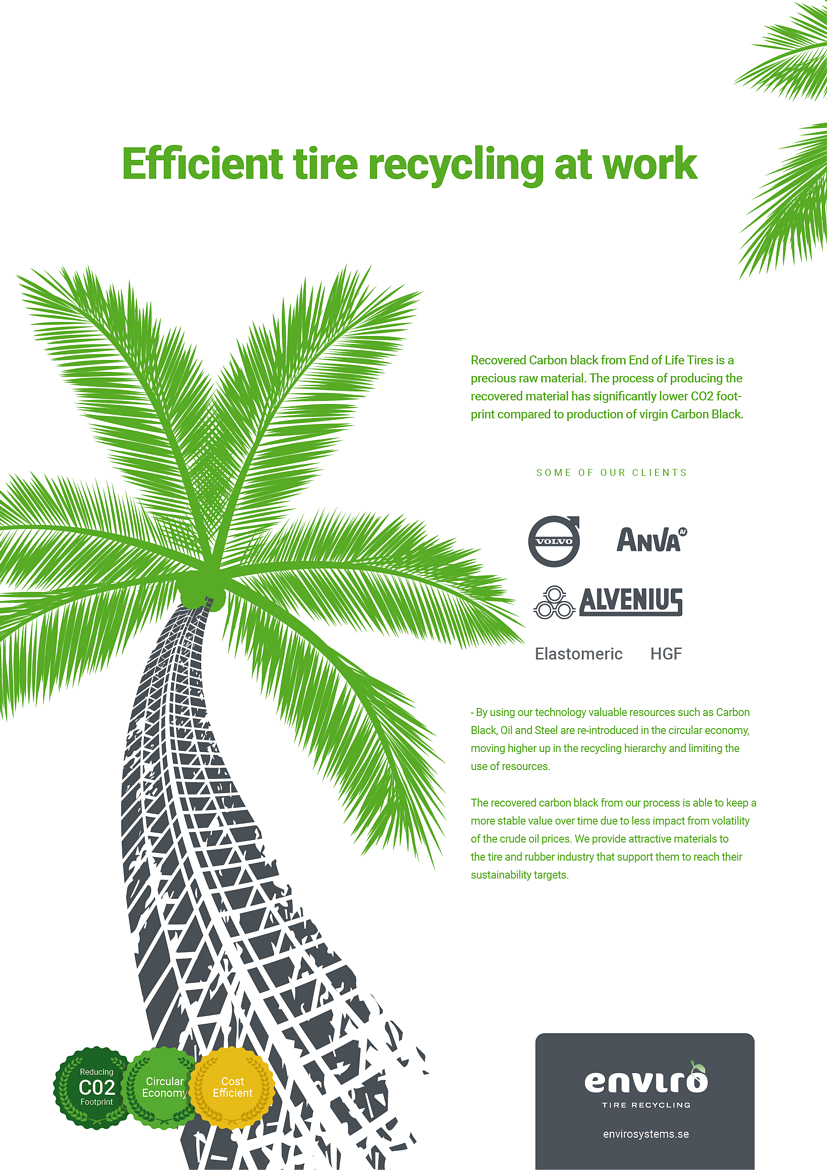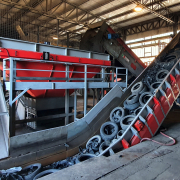Enviro’s rCB Reduces CO2 Emissions by Over 79 Percent – Better Than Earlier Estimates
Enviro’s recovered carbon black is demonstrably a good environmental choice, according to a new life-cycle analysis (LCA) from the IVL Swedish Environmental Research Institute.
Recovered carbon black leads to CO2eq emissions that are 79-84 percent lower than the emissions from the production of virgin carbon black – a figure considerably better than earlier estimates of 60 percent. “It’s fantastic to learn what great environmental benefits Enviro’s recovered carbon black can bring. The whole industry is looking for materials to reduce the impact on the climate, so this is very good news, both environmentally for the industry, and in terms of the economic potential for Enviro”, says Thomas Sörensson, Enviro CEO.

The diagram shows a comparison between virgin CB and Enviro’s rCB for CO2-emissions. Thinkstep and Ecoinvent 3.5 are two different global databases for LCA data linked to specific commodities, which in this case are both virgin CB rubber grade (Source: Scandinavian Enviro Systems AB)
The IVL Swedish Environmental Research Institute, together with Enviro, has carried out a life-cycle analysis (LCA) of Enviro’s recovered carbon black (rCB) EnviroCB and the other materials that are extracted through the company’s pyrolysis techniques: oil, steel and gas. The purpose of the analysis was to provide an overall picture of these materials’ environmental impact, and the results show, among other things, that for each kilo of recovered carbon black that replaces virgin carbon black, total emissions are reduced by 1.43-2.00 kg of CO2. “Enviro’s recovered carbon black provides the tire, rubber and plastic industries with a fantastic opportunity to introduce a recyclable material that heavily reduces the worldwide environmental impact. The other recycled materials – oil, steel and gas – provide a further reduction in greenhouse gas emissions.” One of the indexes used is Global Warming Potential, GWP, which makes it possible to compare the greenhouse effect for greenhouse gases at a joint scale with the greenhouse effect for carbon dioxide (see graph). “If the 9,000 metric tons of recovered carbon black produced by one of Enviro’s plants in a year were to replace virgin carbon black, the resulting reduction in greenhouse gas emissions is 12,900-18,000 tons, which would correspond to more than 40,000 single-leg flights from Stockholm to New York (https://www.icao.int/environmental-protection/CarbonOffset/). In addition to this, we have emission reductions combined with recycled oil, gas and steel.” More stringent environmental laws, producer responsibilities, and an ongoing worldwide shift to more sustainable production is leading to increased interest both in Enviro’s rCB, EnviroCB, the other recycled materials (oil, steel and gas), and the business of Enviro’s plant facilities. “The carbon black market is expected to grow by about 8.8 percent annually in the coming years, and the demand for Enviro’s recycled materials will increase accordingly. These two driving forces are the basis for Enviro’s changed business model, which involves partial ownership of future plant facilities, allowing us to better capitalize on the company’s leading position.” LCA is a method for identifying and measuring the total environmental impact during the life cycle of a given product, from raw material extraction, through manufacturing processes and use, and up to the waste management stage, including all transports and energy expenditures that occur in between. The LCA done by Enviro and the IVL Swedish Environmental Research Institute was carried out in accordance with ISO 14040/14044 for life cycle analysis.
________________
First Recovered Carbon Black Conference: Major Interest from the International Tyre and Rubber Industry
Michelin, Continental and Hexpol were some of the international companies from the tire and rubber industry that participated in the Recovered Carbon Black Conference – the first international conference with the sole focus on recovered Carbon Black (rCB). One highlight was Elysium Nordic presenting the plant project in Denmark, which is led by WindSpace A/S and Enviro.
“We presented where in the project we are at the moment and how we, as climate-focused investors, view the major potential in the rCB market. We received very positive responses, and the presentation also resulted in interesting discussions about the considerable potential of pyrolysis technology in Europe,” says Jens Elton Andersen, CEO and partner of WindSpace and Elysium Nordic. Enviro’s Sales Manager Fredrik Olofsson also spoke at the conference. He presented Enviro’s ongoing discussions on commercial commitments from the tire and rubber industry and on expanding the global production capacity of rCB. “I focused on the progress we’re making with introducing EnviroCB as a natural part of the production in the tire and rubber industry, and how we work to meet the ever-growing demand for rCB by expanding production capacity,” says Fredrik Olofsson. In addition to players from the rCB segment and international tire and rubber manufacturers, the leading producers of virgin carbon black also participated in the conference. They showed great interest both for rCB as a product and various commercial issues that exist within the segment. “The tire and rubber companies all had one thing in common – they stated distinct strategies regarding the introduction of rCB in the production process. We had several interesting discussions and meetings with these companies during the conference,” says Fredrik Olofsson.
________________
(GR 22019, Page 34-Advertorial)








